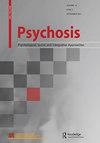社会认同与偏执狂之间的关联:通过信任和敌意归因偏见的中介在英国普通人群研究中
IF 1
4区 医学
Q4 PSYCHIATRY
Psychosis-Psychological Social and Integrative Approaches
Pub Date : 2023-10-23
DOI:10.1080/17522439.2023.2269219
引用次数: 0
摘要
偏执狂是普遍存在于普通人群中的一种常见经历。社会认同是指我们对一个社会群体的归属感,它与偏执狂的形成和维持有关。对这些机制的研究仍在不断涌现。假设信任和敌对归因偏见会在英国普通人群样本中调解这种关系。本文章由计算机程序翻译,如有差异,请以英文原文为准。
The association between social identity and paranoia through the mediators of trust and hostile attribution bias in a UK general population study
Background Paranoia is a common experience prevalent in the general population. Social identity refers to our sense of belonging to a social group and has been implicated in the formation and maintenance of paranoia. Research into these mechanisms is still emerging. It was hypothesised that trust and hostile attribution bias would mediate this relationship in a UK general population sample.
求助全文
通过发布文献求助,成功后即可免费获取论文全文。
去求助
来源期刊
CiteScore
2.20
自引率
8.30%
发文量
36

 求助内容:
求助内容: 应助结果提醒方式:
应助结果提醒方式:


